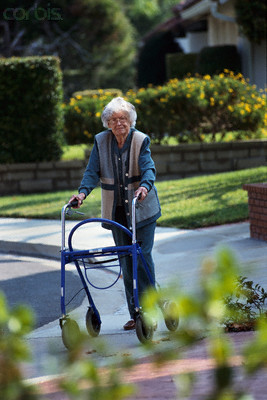- All You Need to Know
- Home
- Right choices
- Walking Speed
Walking speed
Walking speed interestingly is a good predictor of how long you will live.
This page was last updated on 4th June, 2020.
Researchers measured how fast 34,000 adults older than 65 walked over a distance of 13 feet, or 4 metres[1]. Their speeds measured between:
1.3 to 4.6 feet per second.

They then measured how long these people lived, and came up with some interesting data. For example, of men at age 75,
- 87 percent lived another ten years, if they could and did walk fast.
- bur if they walked slowly, only 19 percent lived another ten years.
Walking speed
Walking speed is important obviously but research is needed to prove
that moving even faster will increase your lifespan further.
Mark out 13 feet (4 metres) with a tape measure and ask a friend to time how long it takes you to walk that distance; or estimate it yourself.
Can you walk the 13 feet in about 3 seconds? Then there's a good chance you are going to live another ten years if you are over age 65.
What is the point?
If you have a condition that slows your walking, it's also going to shorten your lifespan.
For example, if you have a short leg, there's a greater chance of you getting hip, back and knee arthritis. These will restrict your pace. Something as simple as a shoe lift from your chiropractor will add years to your life, and some zip into your walking speed.
But don't wait until you have that hip arthritis; prevention is better than a cure. Lying on your back, pull your knee to your chest. Is it stiff and sore in the groin?
But even if you have foot, knee or hip pain, getting them treated so that you can walk faster is going to add quality years to your life.
More difficult would be conditions like Parkinsons. But even there, folk who regularly take omega 3 oil, or better still eat fatty fish, are less likely to get it and Alzheimers too.
It's simple; salmon oil and fatty fish soup should regularly be on the menu.
- FISH OIL HEALTH BENEFITS ...
- FISH SOUP ...
- WAYS TO COOK SALMON ...
Take a stick

If you can walk those 4 metres in 3 seconds, then you'd better make sure you are not dipping too frequently into savings. You're going to need them for perhaps ten years longer than expected.
But, if you can't, then you have less concern about out-living your funds. Take a holiday overseas. Go and SKI; spend the kids' inheritance!
Hip arthritis
Hip arthritis caught early is very manageable with chiropractic; missed and allowed to bloom it will certainly affect your walking speed and ultimately your longevity.
Remember that a leg length inequality is one of the causes of hip arthritis; a simple insert in the shoe is the solution.
As a chiropractor one is often faced with a difficult decision; when do you recommend a patient with hip arthritis goes for a total hip replacement. My criteria are as follows:
- Is it really no longer responding to chiropractic, physical therapy or an exercise regime?
- Is it regularly waking you at night?
- Are you having to take anti inflammatory medication on a regular basis?
- Are you no longer able to easily walk those four metres in three seconds?
If the answer is yes on several counts, then in my book it's time.
What's the downside? It involves a general medication and in the elderly there is significant risk of anaesthetic Alzheimers.
Foot pain
Foot pain can certainly slow your gait. Whether it's a heel spur, or plantar myofascitis or a fixated subtalar joint that was never corrected after an ankle sprain, and has now become arthritic, any pain in the lower extremity can make you miserable, and reduce your walking speed.
Chiropractic has an important role to play in all these conditions.
Research
New research released in 2020, published in JAMA, surprisingly found that walking speed was far less important than the distance walked. Adding an extra 2 miles per day decreased all cause of death by a massive 51%[2].
Chiropractic
Chiropractic sometimes can achieve miraculous change but in the main it takes hard work on the part of the chiropractor to correct these conditions and so enable you to increase your walking speed.
Early detection of hip dysplasia so that the patient can begin with daily strengthening exercises, or correction of a subtalar subluxation after an ankle sprain are bread and butter issues for the astute chiropractor.
Magnesium is a mineral absolutely essential for over 300 biochemical reactions in the body; without adequate amounts you simply cannot be healthy. And it's best to get it from your food. Those enjoying a wide variety of meals need have nothing to fear; yet researchers have found that more than half of Americans fall far short.
Many of these reactions involve the production mitochondria where chemical energy is produced and stored as ATP. It is absolutely essential for the metabolism in muscles cells that will determine our walking speed.
Dark-green leafy vegetables like spinach[3], nuts and seeds[4] are rich sources of magnesium.
- Gait Speed and Survival in Older Adults
- Higher daily step count linked with lower all-cause mortality
- Magnesium from spinach. Web: https://tinyurl.com/sy8725aa
- Magnesium from nuts and seeds. Web: https://tinyurl.com/87fvv53k
When browsing these links use right click and "Open Link in New Tab", or you may get a bad gateway signal.
- Home
- Right choices
- Walking Speed
Did you find this page useful? Then perhaps forward it to a suffering friend. Better still, Tweet or Face Book it.
